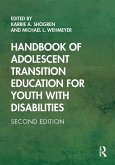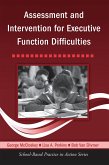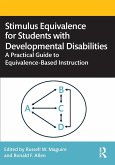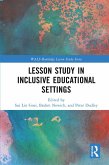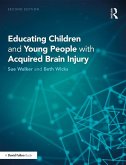Handbook of Effective Inclusive Elementary Schools (eBook, PDF)
Research and Practice
Redaktion: McLeskey, James; Waldron, Nancy L.; Algozzine, Bob; Spooner, Fred
109,95 €
109,95 €
inkl. MwSt.
Sofort per Download lieferbar

55 °P sammeln
109,95 €
Als Download kaufen

109,95 €
inkl. MwSt.
Sofort per Download lieferbar

55 °P sammeln
Jetzt verschenken
Alle Infos zum eBook verschenken
109,95 €
inkl. MwSt.
Sofort per Download lieferbar
Alle Infos zum eBook verschenken

55 °P sammeln
Handbook of Effective Inclusive Elementary Schools (eBook, PDF)
Research and Practice
Redaktion: McLeskey, James; Waldron, Nancy L.; Algozzine, Bob; Spooner, Fred
- Format: PDF
- Merkliste
- Auf die Merkliste
- Bewerten Bewerten
- Teilen
- Produkt teilen
- Produkterinnerung
- Produkterinnerung

Bitte loggen Sie sich zunächst in Ihr Kundenkonto ein oder registrieren Sie sich bei
bücher.de, um das eBook-Abo tolino select nutzen zu können.
Hier können Sie sich einloggen
Hier können Sie sich einloggen
Sie sind bereits eingeloggt. Klicken Sie auf 2. tolino select Abo, um fortzufahren.

Bitte loggen Sie sich zunächst in Ihr Kundenkonto ein oder registrieren Sie sich bei bücher.de, um das eBook-Abo tolino select nutzen zu können.
Now in its Second Edition, this seminal handbook offers a comprehensive exploration of how students with disabilities might be provided classrooms and schools that are both inclusive and effective.
- Geräte: PC
- ohne Kopierschutz
- eBook Hilfe
- Größe: 11.41MB
Andere Kunden interessierten sich auch für
![Handbook of Adolescent Transition Education for Youth with Disabilities (eBook, PDF) Handbook of Adolescent Transition Education for Youth with Disabilities (eBook, PDF)]() Handbook of Adolescent Transition Education for Youth with Disabilities (eBook, PDF)120,95 €
Handbook of Adolescent Transition Education for Youth with Disabilities (eBook, PDF)120,95 €![Assessment and Intervention for Executive Function Difficulties (eBook, PDF) Assessment and Intervention for Executive Function Difficulties (eBook, PDF)]() George McCloskeyAssessment and Intervention for Executive Function Difficulties (eBook, PDF)40,95 €
George McCloskeyAssessment and Intervention for Executive Function Difficulties (eBook, PDF)40,95 €![Shining a Light on the Autism Spectrum (eBook, PDF) Shining a Light on the Autism Spectrum (eBook, PDF)]() Debra CostleyShining a Light on the Autism Spectrum (eBook, PDF)51,95 €
Debra CostleyShining a Light on the Autism Spectrum (eBook, PDF)51,95 €![Stimulus Equivalence for Students with Developmental Disabilities (eBook, PDF) Stimulus Equivalence for Students with Developmental Disabilities (eBook, PDF)]() Stimulus Equivalence for Students with Developmental Disabilities (eBook, PDF)28,95 €
Stimulus Equivalence for Students with Developmental Disabilities (eBook, PDF)28,95 €![Lesson Study in Inclusive Educational Settings (eBook, PDF) Lesson Study in Inclusive Educational Settings (eBook, PDF)]() Lesson Study in Inclusive Educational Settings (eBook, PDF)38,95 €
Lesson Study in Inclusive Educational Settings (eBook, PDF)38,95 €![Excluded From School (eBook, PDF) Excluded From School (eBook, PDF)]() Sue RendallExcluded From School (eBook, PDF)21,95 €
Sue RendallExcluded From School (eBook, PDF)21,95 €![Educating Children and Young People with Acquired Brain Injury (eBook, PDF) Educating Children and Young People with Acquired Brain Injury (eBook, PDF)]() Sue WalkerEducating Children and Young People with Acquired Brain Injury (eBook, PDF)33,95 €
Sue WalkerEducating Children and Young People with Acquired Brain Injury (eBook, PDF)33,95 €-
-
-
Now in its Second Edition, this seminal handbook offers a comprehensive exploration of how students with disabilities might be provided classrooms and schools that are both inclusive and effective.
Dieser Download kann aus rechtlichen Gründen nur mit Rechnungsadresse in A, B, BG, CY, CZ, D, DK, EW, E, FIN, F, GR, HR, H, IRL, I, LT, L, LR, M, NL, PL, P, R, S, SLO, SK ausgeliefert werden.
Produktdetails
- Produktdetails
- Verlag: Taylor & Francis eBooks
- Seitenzahl: 568
- Erscheinungstermin: 26. Oktober 2021
- Englisch
- ISBN-13: 9781000456196
- Artikelnr.: 62525441
- Verlag: Taylor & Francis eBooks
- Seitenzahl: 568
- Erscheinungstermin: 26. Oktober 2021
- Englisch
- ISBN-13: 9781000456196
- Artikelnr.: 62525441
- Herstellerkennzeichnung Die Herstellerinformationen sind derzeit nicht verfügbar.
James McLeskey is Professor in the School of Special Education, School Psychology, and Early Childhood Studies at the University of Florida and a project faculty member and state lead for the CEEDAR Center. His research interests include effective methods for achieving school change/improvement; the role of the principal in developing effective, inclusive schools; and issues that influence teacher learning and the translation of effective instructional methods into practice. Fred Spooner is Professor in the Department of Special Education and Child Development at the University of North Carolina at Charlotte, USA. He is known for his writing in the area of severe disabilities, specifically in teaching academic content to this population. He has published over 125 professional publications on teaching individuals with severe disabilities. Recent research has appeared in Research and Practice for Persons with Severe Disabilities, Remedial and Special Education, Journal of Autism and Developmental Disorders, and Exceptional Children. Bob Algozzine is Professor Emeritus at the University of North Carolina at Charlotte, where he served as Director of the Behavior and Reading Improvement Center, Coordinator of the Research Program in the Department of Educational Leadership, and Research Mentor for the faculty in the Cato College of Education. He was a special education teacher and college professor for more than 40 years. His continuing research interests include assessment and evaluation, data-based decision making, and effective academic and behavior instruction for all students. Nancy L. Waldron is Professor in the School of Special Education, School Psychology, and Early Childhood Studies at the University of Florida, USA. Her research and professional interests include school improvement to enhance inclusive education, school consultation and teacher learning, and school psychology training and credentialing.
Part 1: Developing And Supporting Effective Inclusive Elementary Schools
1. Time to Support Inclusion and Inclusive Schools 2. Principal Actions in
Effective Inclusive Schools: A Review of Elementary Case Studies 3. The
Roles of Teachers in Effective Inclusive Elementary Schools 4. The Role of
Teacher Education in Effective Inclusive Elementary Schools 5. The Role of
Professional Development in Effective Inclusive Elementary Schools Part 2:
Effective District, School, and Classroom Frameworks and Interventions 6.
Supporting Inclusive Practices with Multi-Tiered System of Supports 7.
Supporting Inclusive Practices with Positive Behavioral Interventions and
Supports 8. The Form and Function of Data Teams in Inclusive Schools 9. The
Role of High Leverage Practices in Effective Inclusive Elementary Schools
10. Effective Literacy Instruction in Inclusive Schools 11. Creating
Opportunities for Struggling Mathematics Learners in Inclusive Schools 12.
Writing in Inclusive Elementary Schools: To Be a Writer Or Not To Be a
Writer Part 3: Effective Frameworks And Interventions For Students With
Severe Disabilities 13. Access to the General Education Curriculum 14.
Planning for Effective Inclusive Instruction in Core Content 15. Alternate
Assessments and Monitoring Student Progress in Inclusive Classrooms 16.
Supporting Inclusion Through Peer Support 17. Collaborative Teaming for
Effective Inclusive Education for Students with Severe Disabilities 18.
Intensive Behavioral Support 19. The Potential for Developing and
Supporting Self-Determination in Early Childhood and Elementary Classrooms
Part 4: Systematically Developing Effective Inclusive Schools Now And In
The Future 20. Support for District Change and Improvement 21. Support for
School Change and Improvement 22. Supporting Learners from Culturally and
Linguistically Diverse Backgrounds 23. Using Technology to Support
Effective Inclusive Elementary Schools 24. Supporting Inclusion And
Inclusive Schools
1. Time to Support Inclusion and Inclusive Schools 2. Principal Actions in
Effective Inclusive Schools: A Review of Elementary Case Studies 3. The
Roles of Teachers in Effective Inclusive Elementary Schools 4. The Role of
Teacher Education in Effective Inclusive Elementary Schools 5. The Role of
Professional Development in Effective Inclusive Elementary Schools Part 2:
Effective District, School, and Classroom Frameworks and Interventions 6.
Supporting Inclusive Practices with Multi-Tiered System of Supports 7.
Supporting Inclusive Practices with Positive Behavioral Interventions and
Supports 8. The Form and Function of Data Teams in Inclusive Schools 9. The
Role of High Leverage Practices in Effective Inclusive Elementary Schools
10. Effective Literacy Instruction in Inclusive Schools 11. Creating
Opportunities for Struggling Mathematics Learners in Inclusive Schools 12.
Writing in Inclusive Elementary Schools: To Be a Writer Or Not To Be a
Writer Part 3: Effective Frameworks And Interventions For Students With
Severe Disabilities 13. Access to the General Education Curriculum 14.
Planning for Effective Inclusive Instruction in Core Content 15. Alternate
Assessments and Monitoring Student Progress in Inclusive Classrooms 16.
Supporting Inclusion Through Peer Support 17. Collaborative Teaming for
Effective Inclusive Education for Students with Severe Disabilities 18.
Intensive Behavioral Support 19. The Potential for Developing and
Supporting Self-Determination in Early Childhood and Elementary Classrooms
Part 4: Systematically Developing Effective Inclusive Schools Now And In
The Future 20. Support for District Change and Improvement 21. Support for
School Change and Improvement 22. Supporting Learners from Culturally and
Linguistically Diverse Backgrounds 23. Using Technology to Support
Effective Inclusive Elementary Schools 24. Supporting Inclusion And
Inclusive Schools
Part 1: Developing And Supporting Effective Inclusive Elementary Schools
1. Time to Support Inclusion and Inclusive Schools 2. Principal Actions in
Effective Inclusive Schools: A Review of Elementary Case Studies 3. The
Roles of Teachers in Effective Inclusive Elementary Schools 4. The Role of
Teacher Education in Effective Inclusive Elementary Schools 5. The Role of
Professional Development in Effective Inclusive Elementary Schools Part 2:
Effective District, School, and Classroom Frameworks and Interventions 6.
Supporting Inclusive Practices with Multi-Tiered System of Supports 7.
Supporting Inclusive Practices with Positive Behavioral Interventions and
Supports 8. The Form and Function of Data Teams in Inclusive Schools 9. The
Role of High Leverage Practices in Effective Inclusive Elementary Schools
10. Effective Literacy Instruction in Inclusive Schools 11. Creating
Opportunities for Struggling Mathematics Learners in Inclusive Schools 12.
Writing in Inclusive Elementary Schools: To Be a Writer Or Not To Be a
Writer Part 3: Effective Frameworks And Interventions For Students With
Severe Disabilities 13. Access to the General Education Curriculum 14.
Planning for Effective Inclusive Instruction in Core Content 15. Alternate
Assessments and Monitoring Student Progress in Inclusive Classrooms 16.
Supporting Inclusion Through Peer Support 17. Collaborative Teaming for
Effective Inclusive Education for Students with Severe Disabilities 18.
Intensive Behavioral Support 19. The Potential for Developing and
Supporting Self-Determination in Early Childhood and Elementary Classrooms
Part 4: Systematically Developing Effective Inclusive Schools Now And In
The Future 20. Support for District Change and Improvement 21. Support for
School Change and Improvement 22. Supporting Learners from Culturally and
Linguistically Diverse Backgrounds 23. Using Technology to Support
Effective Inclusive Elementary Schools 24. Supporting Inclusion And
Inclusive Schools
1. Time to Support Inclusion and Inclusive Schools 2. Principal Actions in
Effective Inclusive Schools: A Review of Elementary Case Studies 3. The
Roles of Teachers in Effective Inclusive Elementary Schools 4. The Role of
Teacher Education in Effective Inclusive Elementary Schools 5. The Role of
Professional Development in Effective Inclusive Elementary Schools Part 2:
Effective District, School, and Classroom Frameworks and Interventions 6.
Supporting Inclusive Practices with Multi-Tiered System of Supports 7.
Supporting Inclusive Practices with Positive Behavioral Interventions and
Supports 8. The Form and Function of Data Teams in Inclusive Schools 9. The
Role of High Leverage Practices in Effective Inclusive Elementary Schools
10. Effective Literacy Instruction in Inclusive Schools 11. Creating
Opportunities for Struggling Mathematics Learners in Inclusive Schools 12.
Writing in Inclusive Elementary Schools: To Be a Writer Or Not To Be a
Writer Part 3: Effective Frameworks And Interventions For Students With
Severe Disabilities 13. Access to the General Education Curriculum 14.
Planning for Effective Inclusive Instruction in Core Content 15. Alternate
Assessments and Monitoring Student Progress in Inclusive Classrooms 16.
Supporting Inclusion Through Peer Support 17. Collaborative Teaming for
Effective Inclusive Education for Students with Severe Disabilities 18.
Intensive Behavioral Support 19. The Potential for Developing and
Supporting Self-Determination in Early Childhood and Elementary Classrooms
Part 4: Systematically Developing Effective Inclusive Schools Now And In
The Future 20. Support for District Change and Improvement 21. Support for
School Change and Improvement 22. Supporting Learners from Culturally and
Linguistically Diverse Backgrounds 23. Using Technology to Support
Effective Inclusive Elementary Schools 24. Supporting Inclusion And
Inclusive Schools

